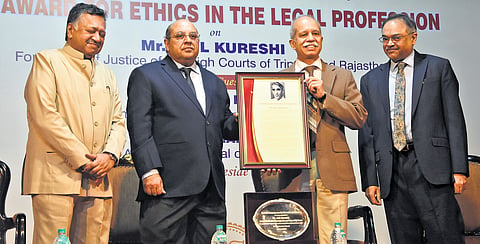

CHENNAI: One of the classic, most misguided, anti-lawyer jokes is a quote from William Shakespeare’s Henry VI, “The first thing we do is, let’s kill all the lawyers.” But the context in which Dick the Butcher utters this phrase is key to understanding its true meaning. The character meant that in order for anything unconstitutional to succeed, you have to kill the lawyers, explains PS Raman, advocate general of Tamil Nadu while delivering the presiding address at the SGS Awards For Ethics In The Legal Profession at Narada Gana Sabha.
The event organised by the juniors of late S Govind Swaminadhan, former advocate general of Tamil Nadu, was held on Sunday to honour Akil Kureshi, former Chief Justice of the High Courts of Tripura and Rajasthan, in the presence of chief guest, Rohinton Nariman, former judge, Supreme Court of India.
Commemorating his guru, Sriram Panchu, senior advocate, said, “S Govind Swaminadhan was appointed as the advocate general of Tamil Nadu in 1969 and continued to hold the office till 1976. The International Bar Association conferred upon him the Legend of the Law award. He passed away in 2003. He was a considerate lawyer, even finer human being. When he was around, there was no code of conduct.
We just had to ask ourselves, what would he do?” Delivering the welcome address, he continued, “Mr Swaminadhan will totally approve of the recipient of this year’s award. It is an absolute honour to celebrate Akil Kureshi. He has become the byword for judicial integrity and independence for embodying the finest judicial values and upholding the constitution and the laws without fear.”
Accepting the award, Akil shared, “I accept the award with all humility. It is a special moment for me and my family. It is special because it is in memory of a person with a great legal mind, sense of humour, and outstanding human qualities. The award is also special because it is for ethics.” Honouring the recipient, Rohinton Nariman also delved deep into how the present judiciary system came into place.
Akil urged that we need to make some introspection at judicial and personal levels. Highlighting the collegium system, he said, “The most ardent supporter of the collegium system will not say it’s perfect. The most bitter critique doesn’t present any viable alternative. My humble view is that three wise men and women, sometimes five, are not enough, to grapple all the aspects of the system that needs to be corrected.
The suggestion would be to make a platform there to invite lawyers, social workers, people from civil society — all of them selected by chief justices of High Courts. A team of 20 people can discuss all possibilities, positives and negatives, to have a holistic idea. Three people cannot simply foresee solutions for complex issues on a national level.”
Asserting that introspection is also needed on a personal level, he said, “ Judges need to have courage. The only ground on which a person can be corrupt is personal ambition. A judge without that has nothing to fear. At the most elementary level, judicial independence is not about executive interference. Nothing should matter to a judge other than his legal understanding.”